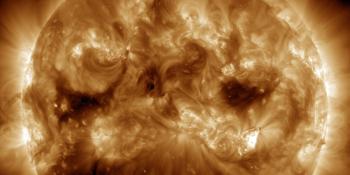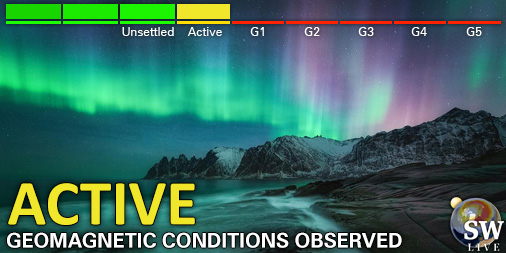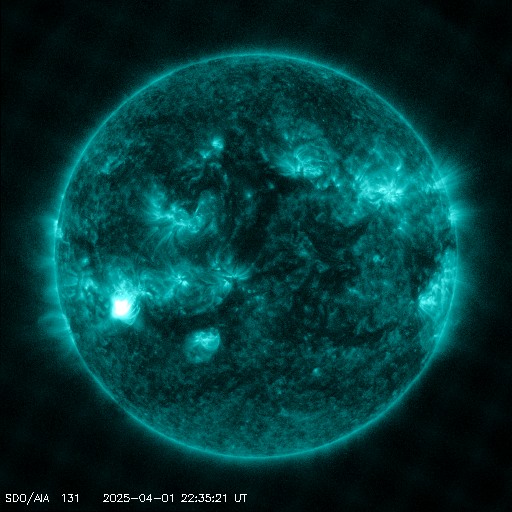Viewing archive of Friday, 21 August 2015
Daily bulletin on solar and geomagnetic activity from the SIDC
Issued: 2015 Aug 21 1230 UTC
SIDC Forecast
Solar flares
M-class flares expected (probability >=50%)
Geomagnetism
Quiet (A<20 and K<4)
Solar protons
Quiet
| 10cm flux | Ap | |
|---|---|---|
| 21 Aug 2015 | 105 | 009 |
| 22 Aug 2015 | 106 | 008 |
| 23 Aug 2015 | 107 | 010 |
Bulletin
Solar activity has increased over the past 24 hours, with Active Region (AR) 2403 (Macintosh:Dkc/Type:Beta-Gamma) showing significant flux emergence, and producing two M-class flares; a M1.2 flare peaking at 02:18 UT and a M1.4 flare peaking at 09:50 UT. The Sun also produced two Coronal Mass Ejections (CMEs); a slow CME first observed from beyond the south west limb at 02:48 UT on 20-Aug-2015, and a more energetic event from beyond the the north east limb at 10:12 UT on 20-Aug-2015. Both are believed to be back-sided and will not interact with the Earth. No evident Earth directed CMEs were produced in the past 24 hours. Solar activity is expected to remain active over the next 24 hours, with AR 2403 producing C-class flares with the possibility of M and X-class flares. The solar wind speed has been slowly decreasing over the past 24 hours, from 500 km/s to 450 km/s. The total interplanetary magnetic field (IMF) strength has been decreasing from 9 nT to 5 nT, and the Bz component has been fluctuating between -6 nT and +6 nT over the past 24 hours. Geomagnetic conditions varied between quiet and active over the past 24 hours, with the local K index (Dourbes) reaching 3 and the Kp index (NOAA) reaching 4 yesterday (2015-Aug-20), these conditions were possibly caused by a coronal hole (CH) located in the north-west region of the sun. The solar wind speed and IMF strength, as recorded by ACE, have both been decreasing and the geomagnetic field is expected to exhibit quiet levels over the next 24 hours.
Today's estimated international sunspot number (ISN): 079, based on 19 stations.Solar indices for 20 Aug 2015
| Wolf number Catania | /// |
| 10cm solar flux | 103 |
| AK Chambon La Forêt | 019 |
| AK Wingst | 016 |
| Estimated Ap | 017 |
| Estimated international sunspot number | 064 - Based on 28 stations |
Noticeable events summary
| Day | Begin | Max | End | Loc | Strength | OP | 10cm | Catania/NOAA | Radio burst types |
|---|---|---|---|---|---|---|---|---|---|
| 21 | 0156 | 0218 | 0237 | S16E39 | M1.2 | 1F | --/2403 |
Provided by the Solar Influences Data analysis Center© - SIDC - Processed by SpaceWeatherLive
All times in UTC
Current data suggests there is a slight possibility for aurora to appear at the following high latitude regions in the near future
Gillam, MB, Yellowknife, NTLatest news
Latest forum messages
Support SpaceWeatherLive.com!
A lot of people come to SpaceWeatherLive to follow the Sun's activity or if there is aurora to be seen, but with more traffic comes higher server costs. Consider a donation if you enjoy SpaceWeatherLive so we can keep the website online!

Latest alerts
Wednesday, 2 April 2025
04:03 UTC - Hemispheric Power Index
The OVATION model predicts the Hemispheric Power Index to reach 50GW at 04:56 UTC
01:45 UTC - Geomagnetic activity
Active geomagnetic conditions (Kp4) Threshold Reached: 01:32 UTC
Tuesday, 1 April 2025
22:51 UTC - Solar flare
Moderate M2.5 flare
22:30 UTC - Radio Blackout
Minor R1 radio blackout in progress (≥M1 - current: M1.45)
07:15 UTC - 10cm Radio Burst
Begin Time: 01/04/2025 06:45 UTC Maximum Time: 01/04/2025 06:45 UTC Duration: 1 minutes. Peak flux: 190 sfu
Space weather facts
| Last X-flare | 2025/03/28 | X1.1 |
| Last M-flare | 2025/04/01 | M2.5 |
| Last geomagnetic storm | 2025/03/27 | Kp5 (G1) |
| Spotless days | |
|---|---|
| Last spotless day | 2022/06/08 |
| Monthly mean Sunspot Number | |
|---|---|
| February 2025 | 154.6 +17.6 |
| April 2025 | 152.5 -2.1 |
| Last 30 days | 130.7 -17.9 |




